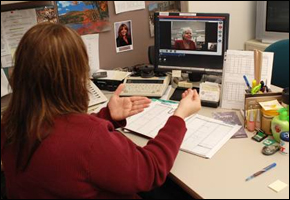WASHINGTON, August 22, 2008—While most FBI employees find work-related
communications spontaneous, those with hearing impairments face a number
of challenges just to take part in standard office meetings. A recently completed
initiative between the Office of Equal Employment Opportunity Affairs (OEEOA)
and the Information Technology Operations Division’s Network Section,
brought a welcome change to the process.
Currently, the FBI has 24 employees nationwide who are deaf and use sign
language to communicate. However, the Bureau only has two staff sign language
interpreters; one located at FBI Headquarters and the other at the Criminal
Justice Information Services Division (CJIS) in West Virginia.
Kristen Parkhouse, formerly a sign language interpreter with the OEEOA at
FBI Headquarters, joined the FBI and took on the responsibility of coordinating
and providing the interpreting services for deaf employees nationwide and
for insuring all investigations involving persons who are deaf (i.e. suspects,
witnesses, victims, associates) are provided interpreting services.
 |
Trudy Ford, Sign Language Interpreter, helps a hearing impaired FBI
employee communicate. |
The OEEOA “dedicates a considerable amount of its budget to contract
interpreting services,” said Ms. Parkhouse. “My co-worker, Trudy
Ford at CJIS, and I traveled over 30 times a year. However, with all of this
time and money being dedicated, our FBI employees who are deaf only receive
on average two hours of interpreting services a week, which is inadequate.”
In August 2005, the OEEOA and employees from the Disabilities Advisory Committee
attended meetings with the ITOD/Network Section/Clarksburg Technology and
Operations Unit (CTOU) to discuss the possibility of using the existing Secure
Video Teleconferencing (SVTC) network to provide real time access for deaf
employees and interpreters.
After the group determined that a pilot test should be conducted to evaluate
the technology and fine tune the equipment, the ITOD/Network Section/CTOU/SVTC
program provided five Polycom via video desktop systems that were installed
on FBINET workstations. CTOU worked closely with the field offices to install
and activate the software and hardware. The interpreters were also provided
desktop SVTC systems. Three hearing impaired employees, located at the Albany,
N.Y., the Indianapolis, and the Washington, D.C., field offices, participated
in this pilot program.
The pilot program was a success and the results helped document the final
configuration for the system deployment. In Fiscal Year 2007, the CTOU extended
these services to the remaining deaf employees and their supervisors.
Today, the SVTC network allows employees and managers to reach a remote “on-call” interpreter
to conduct business in real-time. With the help of Ms. Ford and David Carlson
in CJIS, hearing impaired employees can now check an on-line calendar to
see the interpreter’s availability and then get an interpreter within
minutes, not days.
"As a new employee in the Washington field office, I am able to access
sign language interpreting services through the SVTC program,” said
Jane Lee, Information Technology Specialist. “This program helps me
participate in last-minute meetings and team discussions more readily. I
find this very useful to me in performing my duties when there's no staff
interpreter or contractor interpreter available. It is a great asset and
it makes me feel more connected with my office."
Tammy MacKay, a Supervisory IT Specialist at the WFO, agrees. “The
SVTC program offers us the flexibility to hold last minute meetings and provides
the ability to have impromptu communication amongst co-workers. It is an
invaluable system.”


